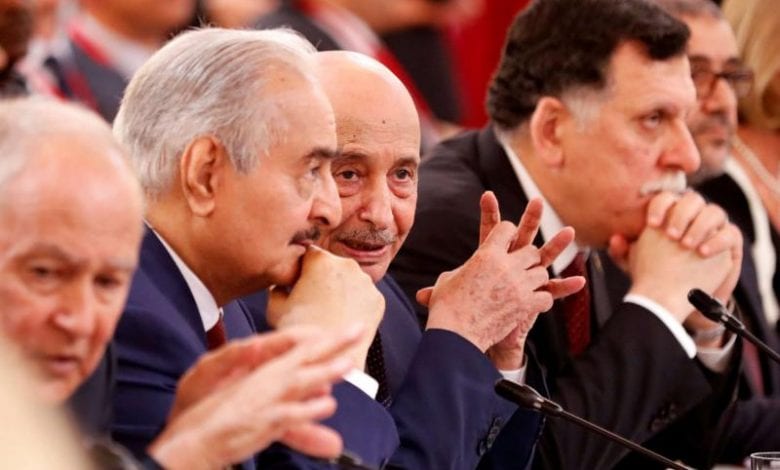The head of the Presidential Council of the Government of National Accord, Fayez al-Sarraj, and the Speaker of the Libya House of Representatives, Aguila Saleh, issued two statements on Friday, declaring a ceasefire across the whole of the Libyan territory.
Announcement of a ceasefire by the rival factions in the Libyan conflict sparked cautious optimism, amid fears that its implementation could be stalled due to the likely emergence of differences over details.
The two statements included a call for “the resumption of oil production and export, and blocking its revenues in a special account at the Libyan Foreign Bank, which will not be touched until a political settlement is reached in accordance with the outcomes of the Berlin Conference, and with the guarantee of the UN mission and the international community.”
The two statements reflected consensus on a number of points, including the issue of dispositing of oil revenues and making Sirte and Jufra regions a demilitarized zone. But divergences on some details regarding the contested regions, which were the focus of escalation during the last period, may impede the implementation of the agreement.
Political analyst Jalal Harchaoui, a researcher specialising in Libyan affairs at the Clingendael Institute for International Relations in The Hague, wondered if “this declaration was fully achievable.” He believes that “its implementation is likely to be difficult,” noting that there are several regional powers that may play a destabilising role in the agreement.
It is clear that there are concerns about the commitment of the Tripoli government (the Government of National Accord) to the ceasefire, as it might simply take it as a truce to give Turkey time to rearrange its cards in Libya, and to fragment the regional position rejecting Ankara’s interventions. This is why a complete ceasefire would be the appropriate formula for any agreement that may occur.
According to observers, Turkey’s experiences of ceasefires in Syria confirm that Ankara is good at using them to manoeuvre. Besides, it wants to resort to a temporary truce in order to absorb regional and international anger.
Some analysts view the Tripoli government’s approval of the ceasefire with suspicion. They attribute its acceptance of the ceasefire to the pressures it is experiencing, whether externally or internally, especially the financial crunch caused by the stoppage in oil exports.
Observers say that the devil lies in the details of implementing the ceasefire and the necessary security arrangements regarding the demilitarized zone, and in how to prepare for parliamentary and presidential elections next March.
Al-Sarraj stressed that “achieving an actual ceasefire requires that the areas of Sirte and Jufra become demilitarised, and that the police forces of both sides agree on security arrangements inside the two areas.” Aguila Saleh, however, did not even mention Jufra and only suggested that “the city of Sirte be the temporary seat for the new Presidential Council, bringing all Libyans together and closer, provided that an official police force from various regions would secure the city, in preparation for the unification of state institutions as a basic consensual stage of the process of construction, provided that military arrangements are completed according to the UN-sponsored negotiation track (5 + 5), whose outputs will be binding once they are agreed upon and officially announced.”
While Aguila Saleh stressed the need for the police forces to be “official security forces,” that is to say, they must have national police badge numbers since before 2011, observers do not rule out that the Government of National Accord would not hesitate to provide militia elements who recently underwent some training in policing in order to prepare them for this particular task and offer them as regular police forces.
It is unlikely that the army, which has not commented on the agreement, will agree to withdraw from Sirte and Jufra before receiving guarantees that GNA mercenaries and militias will not be part of the forces which will secure the demilitarised zone. There are expectations, however, that the army will demand to leave negotiations regarding Sirte and Jufra till last and not start with them as the Islamists and Turkey want.
Aguila Saleh’s statement reflects an endeavour to transform the city of Sirte into a political capital that does not belong to any of Libya’s three historical regions: Tripoli, Barga and Fezzan. However, it is unlikely that the GNA, and behind it Ankara and Washington, will be open to the idea, given that Tripoli believes that the central region belongs to it and will not easily let go of it, especially since most of the oil fields and terminals are concentrated there.
The Libya Revival bloc led by the Parliament’s envoy to the European Union and the African Union had proposed to United Nations Secretary-General, Antonio Guterres, an initiative aiming “to declare the city of Sirte a demilitarized zone under the control of the United Nations, and to freeze all battle fronts in order to avoid the risk of an imminent regional clash between the two largest armies in our region, namely the Turkish army and the Egyptian army.”
Since the Libyan Army’s withdrawal from Tripoli, Turkey has been threatening to launch a war to seize Sirte, Jufra and the oil terminals, which was met with a clear Egyptian threat to counter any attack on them.
Several Western powers were receptive to the Friday’s developments as they feared a conflagration in Libya would force them to take sides in the conflict. They find the ceasefire agreement a convenient solution to satisfy the GNA and Turkey without having to openly broach the thorny topic of Syrian mercenaries in Tripoli for the moment, and without having to put pressure on Khalifa Haftar after his approval of resuming oil production and export a few days ago.


























































































